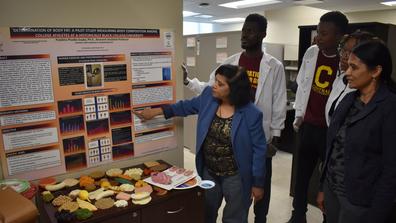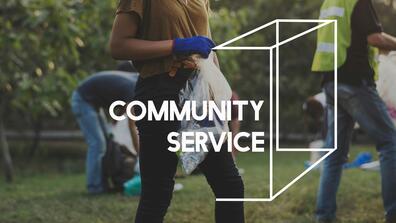Police chief spearheads food and hygiene pantry

Throughout the entirety of the seven years that Chief Stephanie Hill has been heading up the Central State University Police Department (CSUPD), she has done all she can to execute an intimate, hands-on approach to connecting with Marauders on campus.
According to Hill, being a police chief and running her department is a far greater task than merely maintaining the peace and safety of campus life. It’s also a matter of ensuring students feel secure in their day-to-day living. This includes helping wherever Hill can to support and assist Marauders who may need extra assistance when it comes to acquiring basic supplies, such as food and hygiene products.
For the better part of the past half-decade, Hill has, in fact, been taking the substantial step of personally purchasing such sundries and encouraging her police officers to do what they can, too, to donate goods directly to students who could benefit from being given everything from toothpaste and tampons to jackets and microwaves.
In order to maximize the coordination of these efforts, Hill has in the past year established the PD Food and Hygiene Pantry housed in the police department building right on the other side of the wall to her own office.
Although the vast majority of the items therein — soda, frozen TV dinners, milk, Ramen, peanut butter, soap, shampoo, laundry detergent pods, etc. — continue to be purchased by Hill and campus police officers themselves, it is her hope that students and faculty members, local community members, and even alumni living outside of the area who are able could donate products in order to swell the girth and utility of the pantry’s offerings.
“This started when we had a student who came to us needing a certain feminine hygiene product,” Hill said. “The officer who was there went to the Speedway and purchased the item for the student, and it was then that we started noticing and better understanding such needs students have who simply can’t afford to pay for things like that.”
Hill and her officers next began buying pizza — again, paid for out of their own pockets — for students who had trouble keeping up with food costs while attending school. Soon, members of the police department realized that they could expand their humanitarian efforts by having items, including at times clothing, on hand for students coming by who could benefit from the same. This building of their on-site storage led to the pantry, which Hill now wants to expand through community donations.
“The goal of the pantry is for students to come in and get even something as small as an occasional snack,” Hill said.
“There are those students, though, who may be a little shy and say they only want the snack but really want a hot meal. Frozen TV dinners are the most popular items and something we could use much more of, which is why I also donated a refrigerator with a freezer on the upper part of it and am soon bringing in a larger standalone freezer, as well.”
Due to the fact that Hill is indeed aware some students may feel slightly embarrassed about coming to the station for free food and other products, she insists that the space is a judgment-free zone. This means that anyone who needs anything is welcome to partake without having to show an ID or even give their name. Financial need is not considered. No records whatsoever are kept.
Although the facility is open during business hours of 8 a.m.-5 p.m., for those who wish to donate or may need to take supplies home, the police department itself is open 24/7 and there will always be an officer present to open the pantry as needed.
“I’m not a mother, I don’t have kids myself, but I have compassion,” Hill said. “I remember going to college myself and not having the money for three meals a day. I couldn’t call home to ask for money, because my family member was a single mother and didn’t have it either. So, I understand that need.
“And if I see any student who may be, say, walking around during the wintertime in 5-degree weather without a thick coat, I may go up and help them buy that coat or give them warmer socks. Whatever they need.”
Hill motivates her officers to be similarly proactive in their philanthropy through such programs as her “No Shave November.” Officers who wish to participate are given permission to grow out their beards, despite the fact this violates regular PD grooming policies. The cost of participating is either being sponsored by friends or the officers themselves paying a $50 fee. This $50 goes to credit for gift cards or direct food products such as canned food. The person voted by the department to have the best beard is then allowed to keep their facial hair until the end of the calendar year.
“It’s just a way to have fun with all of this,” Hill said, adding that it was this past “No Shave November” when she decided the $50 donations of supplies would be used to start the PD Food and Hygiene Pantry.
Donations Hill solicits do not stop at her own department. She worked with her own dentist on bringing in bundles of toothpaste and toothbrushes to the pantry recently, and she’ll sometimes similarly lean on friends and family members to help out with what they can, too. Hill’s mother will offer, when she visits, as much as $500 or $600 worth of items for the pantry. This cost amounts to what it typically costs to maintain a useable amount of storage therein every five weeks.
“We hope as we work to get the word out about what we’re doing, more people will come to us with donations and we’ll be able to be overflowing with product,” Hill said. “We hope we’ll have an abundance and regular donors who will help us out.”
The next step Hill is working on is setting up a foundation through Central State’s Department of Institutional Advancement toward which donors can directly provide products for the pantry.
Although Hill said that the police department will never turn any supplies away, she does prefer non-perishable items. Fruit, for example, can go bad quite quickly.
Single-serve items are also preferred, as bulk items — a large bag of potatoes, maybe — can also go bad fast and will be hard to carry out and back to the dorms. Hill and her staff also do what they can to observe food allergies, keeping peanut-based products away from other foodstuff and avoiding gluten-based products such as bread. Hill is additionally sensitive to the fact that many students on campus do not eat pork, and thus she tends to stock frozen meals and the like that are chicken-based.
“This is about humanity, about providing a basic human need,” Hill said.
“We wanted to do something to show the students that we care. We can say that all day long, but we want to connect with them and really show them we mean what we say. Our officers do a phenomenal job of community policing. And yet, there are still those students who may not feel comfortable approaching an officer for whatever reason. But when you help provide someone with food or clothing or a way to clean themselves, that brings out a connection. It brings that human compassion together.” Anyone wishing to donate items to the pantry may drop them off at the Central State University Office of Campus Police between the hours of 8:00 a.m. and 5:00 p.m., email police@centralstate.edu or call 937-376-5111.


